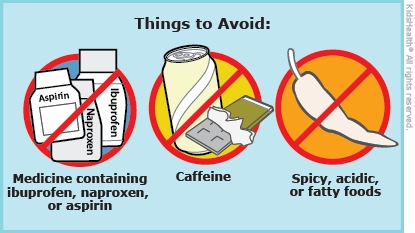Gastritis is inflammation (irritation and swelling) of the stomach lining. Kids with gastritis can have stomach pain or discomfort, bloating, heartburn, nausea, vomiting, or a feeling of fullness even when they haven't eaten. Medicine and diet changes can help kids with gastritis feel better.



Your child:

Your child:

What causes gastritis? Sometimes the cause of gastritis isn't known. Other times it can be caused by:
How is gastritis treated? Treatment depends on the cause. Avoiding medicines and foods that irritate the stomach is an important part of treatment. The health care provider might give antibiotics if there is an infection. Other medicines can help the stomach make less acid or protect it from the acid it makes.
Does my child need tests? Sometimes other tests are needed, such as: